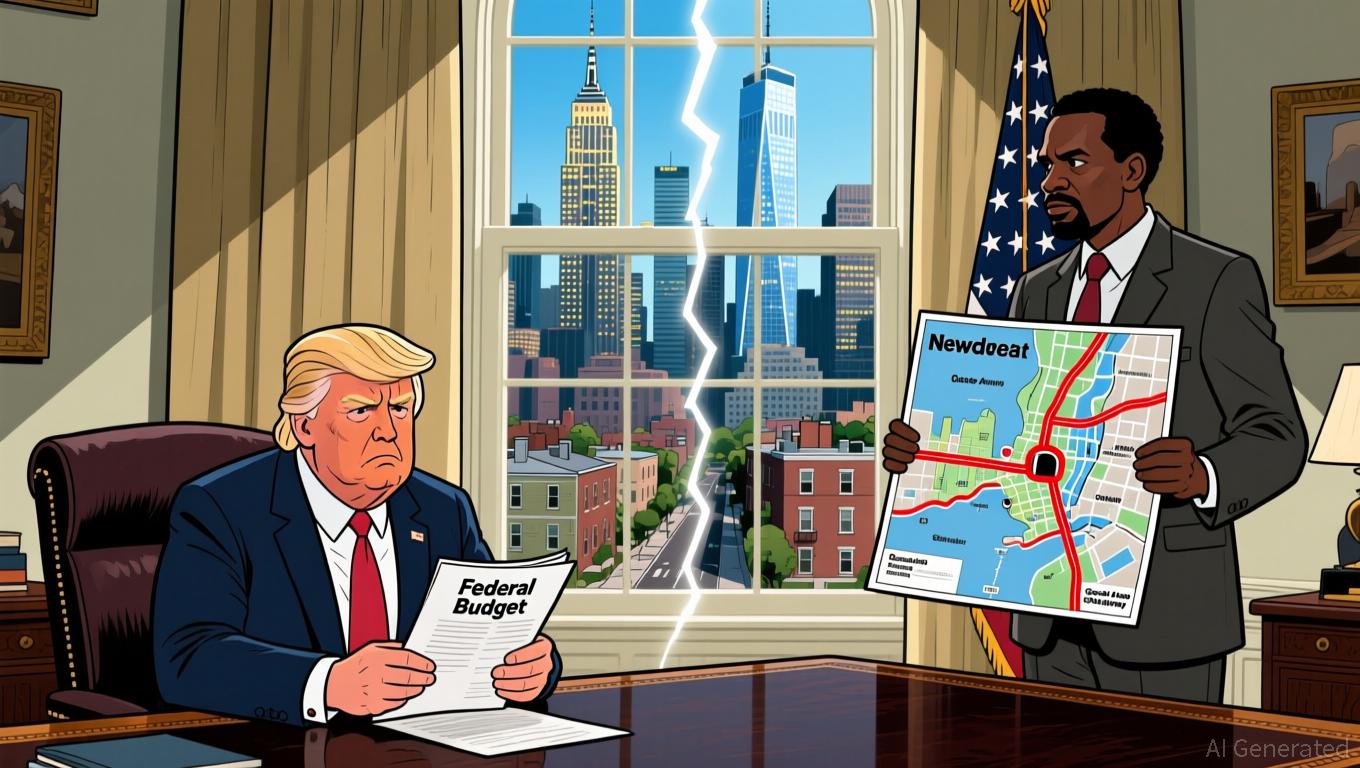Trump and Mamdani’s Bet on Affordability: Uniting Opposing Ideologies
- Trump and Mamdani's Nov. 21 meeting highlights clashing ideologies on affordability and governance, with New York's $1.286T economy at stake. - Both leaders share focus on cost-of-living crises but differ sharply on solutions, with Trump threatening federal funding cuts and Mamdani advocating rent freezes. - Experts see the dialogue as critical for redefining strained city-federal relations, emphasizing urban centers' role as economic engines. - Mamdani's corporate tax proposals clash with Trump's deregu
The November 21 discussion at the White House between President Donald Trump and New York’s incoming mayor, Zohran Mamdani, has become a flashpoint in national politics. Observers see the meeting as a crucial test for the relationship between city leadership and the federal government. Mamdani, a 34-year-old democratic socialist, and Trump, a 79-year-old Republican, have sharply contrasting approaches to economic issues, but both made the rising cost of living a central theme in their campaigns—a common concern that may shape their conversation
Mamdani’s election win has been met with strong opposition from Trump, who has repeatedly called him a “communist” and threatened to cut off federal support to New York City. The president has also suggested deploying military or immigration officials to the city, a threat Mamdani has dismissed as exaggerated. Speaking to the press before the meeting, Mamdani reaffirmed his focus on making the city more affordable, saying, “No one understands the burden of high living expenses better than New Yorkers,” and pledged to pursue policies that would help the city’s 8.5 million people

Mamdani’s agenda—which includes policies like freezing rents and providing universal childcare—has drawn harsh criticism from Trump, who sees these measures as a threat to market freedoms. Nevertheless, both leaders have found some alignment in their emphasis on affordability. Mamdani pointed out that one in ten Trump voters in New York ultimately backed his campaign, attracted by his promises to address the cost-of-living crisis
The broader impact on business interests is also considerable. Mamdani’s proposals to increase taxes on corporations and the wealthy reflect a growing critique of economic inequality, which some analysts, including an unnamed Bloomberg commentator, describe as a “reckoning” for industries reliant on capital. In contrast, Trump has promoted business-friendly policies such as deregulation and tariffs, which his critics say have contributed to inflation. This confrontation highlights a national debate over how to balance economic prosperity with social fairness.
As the meeting draws near, Mamdani must contend with Trump’s unpredictability while advocating for New York’s priorities. His team has stressed the importance of restoring federal funding, especially for major infrastructure projects like the Gateway tunnel and the Second Avenue Subway
More broadly, this meeting highlights the growing divide between progressive cities and a federal government focused on conservative economic strategies. With New York’s GDP approaching $1.286 trillion and its role as a global financial center on the line, the outcome could shape how cities and the federal government interact during Trump’s second term.
Disclaimer: The content of this article solely reflects the author's opinion and does not represent the platform in any capacity. This article is not intended to serve as a reference for making investment decisions.
You may also like
Only 106M Bitcoin Owners Worldwide, Says BitBo
New data from BitBo shows there are just 106 million Bitcoin owners globally.What the 106 Million Figure MeansBitcoin Adoption Has Room to Grow

$6B Bitcoin Shorts at Risk in Massive Squeeze
A $10K Bitcoin surge could liquidate $6 billion in shorts, triggering a major market shift.What’s Driving the Momentum?Market Outlook Ahead

$3.7B in Crypto Longs Wiped Out This Week
Over $3.7 billion in long crypto positions were liquidated in just 7 days, shocking traders across the market.What Caused the Sell-Off?What This Means for Investors

Bessent: $11B Shutdown Hit Won’t Trigger Recession
Despite an $11B loss from the shutdown, experts say the U.S. economy is not facing a recession.Strong Fundamentals Keep Recession Fears LowShutdown Impacts Are Real — But Contained
